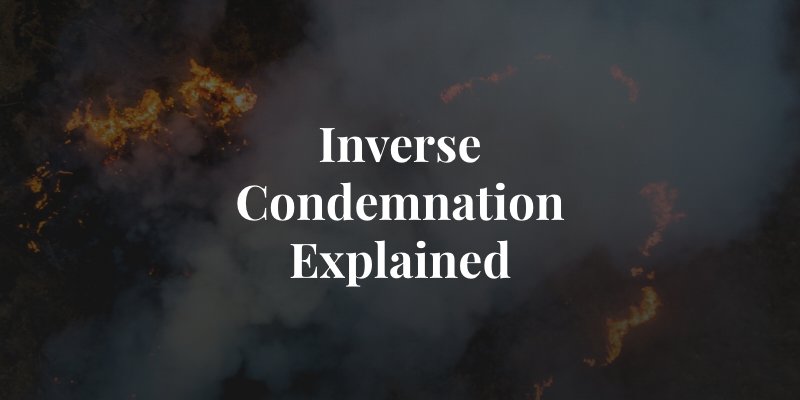In the aftermath of a California wildfire, you may realize that you have the right to file a property insurance claim to seek coverage for your losses. In addition, if an individual or entity is responsible for causing the wildfire, you could pursue a lawsuit against this party. Thanks to a legal doctrine known as inverse condemnation, however, you could also be eligible for compensation from a public utility company – without having to prove negligence. Discuss your path to financial recovery with our California wildfire lawyers.

What Is Inverse Condemnation?
Inverse condemnation is a legal doctrine that stems from the Takings Clause in Article One, Section 19 of the California Constitution. This law gives property owners in California the ability to file legal claims in pursuit of financial compensation for damage done against any electric or utility company, regardless of whether the entity was negligent. Inverse condemnation is a liability risk that utility companies accept in exchange for the power of eminent domain, meaning the government’s right to take private property and utilize it for public use. Even if a wildfire was not a foreseeable risk and the public entity or utility company did not behave carelessly, it can be made to pay for victims’ losses under this doctrine. An inverse condemnation claim uses the rule of strict liability. This means a party can be held legally accountable in an injury or property damage claim without requiring proof of negligence, or the failure to act with proper care, in relation to the incident. Strict liability makes it easier for a plaintiff to recover financial compensation from a defendant.
Using Inverse Condemnation to Hold Public Utilities Accountable
Under state law, inverse condemnation claims for wildfires can be brought against public utility companies, support agencies, the state or local government, and investor-owned utilities. This means a utility or electric company in California could be held strictly liable for causing a wildfire. Inverse condemnation is such an important law in California because of the long history of public utility companies being responsible for major wildfires. Some of the deadliest and most destructive wildfires in the state’s history have been linked to faulty utility company equipment; for example, Pacific Gas & Electric Company (PG&E) was held liable for the 2018 Camp Fire.
What Compensation Can Wildfire Victims Recover?
Filing a legal action in California while invoking the doctrine of inverse condemnation could lead to a financial damage award that helps the victim pay for related losses and move forward. Potential damages include:
- Home and other property damage repairs
- Repair or replacement of personal belongings
- Business-related losses
- Diminished property value
- Evacuation or relocation costs
- Temporary housing
- Emotional distress, in some cases
If you file a claim with your insurance provider, this will not prevent you from taking additional legal action against a utility company or government agency for losses that your insurance does not cover.
When Should You Hire a Wildfire Lawyer?
Inverse condemnation has a major impact on wildfire claims in California. This rule permits public entities to be held liable for wildfire damage related to their equipment, regardless of whether they were negligent. This does not mean, however, that recovering financial compensation for a wildfire will be seamless. You may still encounter various challenges as a claimant. It is important to always consult with a wildfire attorney near you about your case.
